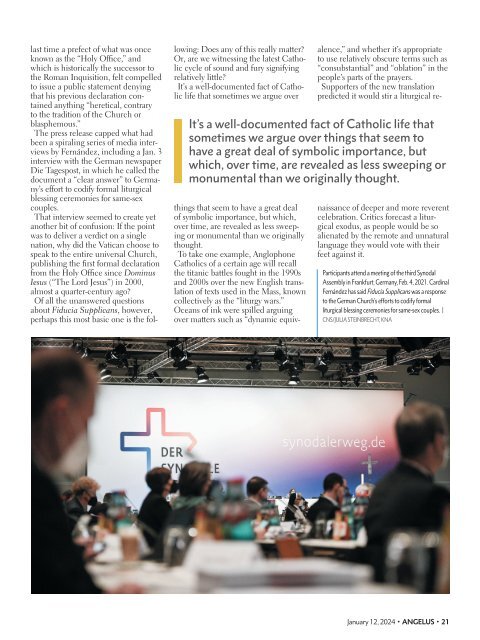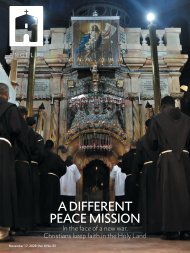Angelus News | January 12, 2024 | Vol. 9 No. 1
On the cover: The Vatican’s new document Fiducia Supplicans on blessings for those in same-sex or “irregular” relationships has probably left the average Catholic with more questions than answers. What does it really say, and why is it so controversial? On Page 10, we break down the saga of the document’s reception with a sampling of some key reactions that illustrate what’s at stake. On Page 20, John Allen explains why the impact of Fiducia on the global Church may be more limited than we think.
On the cover: The Vatican’s new document Fiducia Supplicans on blessings for those in same-sex or “irregular” relationships has probably left the average Catholic with more questions than answers. What does it really say, and why is it so controversial? On Page 10, we break down the saga of the document’s reception with a sampling of some key reactions that illustrate what’s at stake. On Page 20, John Allen explains why the impact of Fiducia on the global Church may be more limited than we think.
You also want an ePaper? Increase the reach of your titles
YUMPU automatically turns print PDFs into web optimized ePapers that Google loves.
last time a prefect of what was once<br />
known as the “Holy Office,” and<br />
which is historically the successor to<br />
the Roman Inquisition, felt compelled<br />
to issue a public statement denying<br />
that his previous declaration contained<br />
anything “heretical, contrary<br />
to the tradition of the Church or<br />
blasphemous.”<br />
The press release capped what had<br />
been a spiraling series of media interviews<br />
by Fernández, including a Jan. 3<br />
interview with the German newspaper<br />
Die Tagespost, in which he called the<br />
document a “clear answer” to Germany’s<br />
effort to codify formal liturgical<br />
blessing ceremonies for same-sex<br />
couples.<br />
That interview seemed to create yet<br />
another bit of confusion: If the point<br />
was to deliver a verdict on a single<br />
nation, why did the Vatican choose to<br />
speak to the entire universal Church,<br />
publishing the first formal declaration<br />
from the Holy Office since Dominus<br />
Iesus (“The Lord Jesus”) in 2000,<br />
almost a quarter-century ago?<br />
Of all the unanswered questions<br />
about Fiducia Supplicans, however,<br />
perhaps this most basic one is the following:<br />
Does any of this really matter?<br />
Or, are we witnessing the latest Catholic<br />
cycle of sound and fury signifying<br />
relatively little?<br />
It’s a well-documented fact of Catholic<br />
life that sometimes we argue over<br />
It’s a well-documented fact of Catholic life that<br />
sometimes we argue over things that seem to<br />
have a great deal of symbolic importance, but<br />
which, over time, are revealed as less sweeping or<br />
monumental than we originally thought.<br />
things that seem to have a great deal<br />
of symbolic importance, but which,<br />
over time, are revealed as less sweeping<br />
or monumental than we originally<br />
thought.<br />
To take one example, Anglophone<br />
Catholics of a certain age will recall<br />
the titanic battles fought in the 1990s<br />
and 2000s over the new English translation<br />
of texts used in the Mass, known<br />
collectively as the “liturgy wars.”<br />
Oceans of ink were spilled arguing<br />
over matters such as “dynamic equivalence,”<br />
and whether it’s appropriate<br />
to use relatively obscure terms such as<br />
“consubstantial” and “oblation” in the<br />
people’s parts of the prayers.<br />
Supporters of the new translation<br />
predicted it would stir a liturgical renaissance<br />
of deeper and more reverent<br />
celebration. Critics forecast a liturgical<br />
exodus, as people would be so<br />
alienated by the remote and unnatural<br />
language they would vote with their<br />
feet against it.<br />
Participants attend a meeting of the third Synodal<br />
Assembly in Frankfurt, Germany, Feb. 4, 2021. Cardinal<br />
Fernández has said Fiducia Supplicans was a response<br />
to the German Church’s efforts to codify formal<br />
liturgical blessing ceremonies for same-sex couples. |<br />
CNS/JULIA STEINBRECHT, KNA<br />
<strong>January</strong> <strong>12</strong>, <strong>2024</strong> • ANGELUS • 21

















